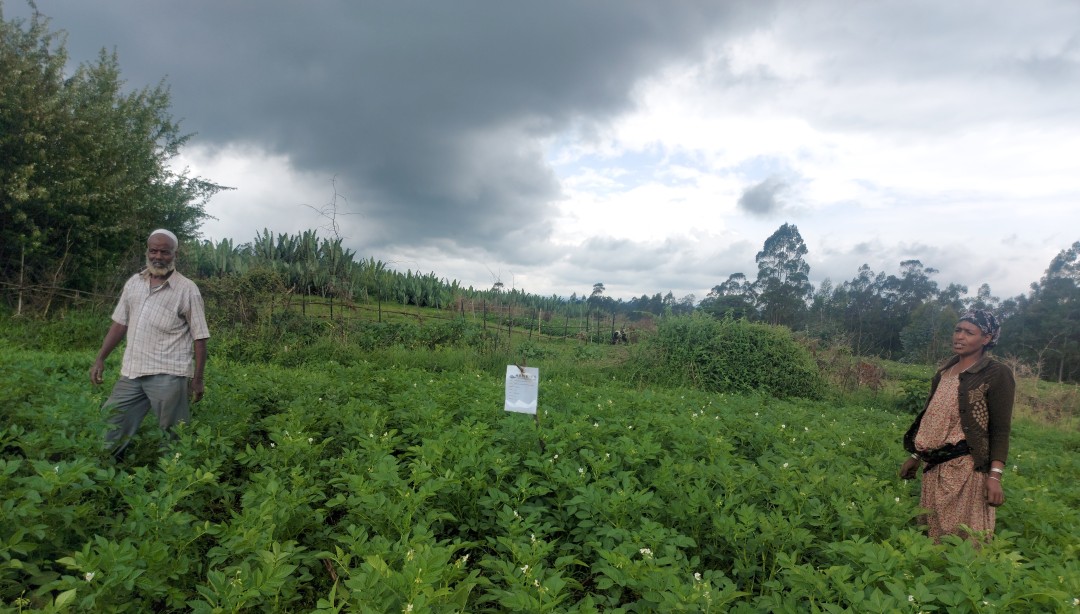Potato cultivation is a crucial agricultural activity in Ethiopia, particularly in highland and mid-altitude areas during belg and meher seasons. The Southern National, Nationalities and Peoples Regional (SNNPR) state is the largest contributor to the country’s annual production, accounting for 42% of the total area and over 47% of the national production. The major potato growing areas in SNNPR include Gurage, Gamo, Gedeo, and Welaita, among others. Despite its significance, potato farming in Ethiopia faces several challenges, particularly in the Gumer area of Gurage zone.
The most significant challenge is the seed system problem, which has hindered farmers’ productivity and profitability. The potato seed system problem was flagged as a major concern during the 2022 south RAISE-FS stakeholder meeting. Farmers in the region have been trying to maintain their potato seed source, but they face challenges due to a lack of seed producer cooperatives and poor market linkage for the multiplied potato tuber seed. The availability of clean and quality seed potato is a critical challenge to farmers, and if they are offered clean seed, they are willing to do their best to maintain it. However, the challenge is getting the clean and quality seed to multiply and produce ware potato.
To address this issue, during the 2022 meher season, two improved potato varieties (Gudene and Menagesha) were brought by Worabe Agricultural Research Centre from Adula Seed Potato Multiplier PLC in Oromia and validated on farmers’ fields. In a participatory variety selection, most participating farmers selected Gudene variety based on their parameters. However, some farmers maintained the seed of Menagesha variety which was not selected during the validation trial.
During the visit to farmers’ demonstration fields, the RAISE-FS team observed farmers were multiplying Menagesha variety for seed. The phenomenon showed how unavailability of clean and quality potato tuber seed is a critical challenge to farmers. It proved in whatever means farmers get clean seed of a popular variety, they will maintain with care and necessary management practices.
In Bordena Denber kebele, farmers said that “We have been facing a serious problem of yield reduction due to the degeneration of our own seed. The repeated use of this tuber seed for many generations has resulted in the deterioration of its quality. However, last year, a project introduced and demonstrated two new varieties of seeds. We participated in the evaluation and selection process, and we selected the Gudenie variety. We cultivated variety Gudenie, which we preferred. However, some farmers maintained and multiplied the other variety also.”
The observed efforts of farmers to maintain and multiply potato tuber seed that has not been selected during evaluation showed how farmers are challenged to get clean seed potatoes. Farmers’ efforts to maintain and multiply the seed they secured in some way is commendable, but it needs a collaborative effort from all relevant stakeholders in the system to address the potato production problem in Gumer woreda and similar potato growing areas. Enhancing the seed value chain can ensure that farmers have access to clean and quality seed potatoes, which can lead to increased productivity and improved livelihoods. The establishment of seed producer cooperatives can help ensure that farmers have access to quality seeds at affordable prices and at the right time.

In conclusion, addressing the challenges faced by potato farmers in the Gumer area of Ethiopia requires a collaborative effort from all relevant stakeholders in the system. Enhancing the value chain through the establishment of seed producer cooperatives, improving market linkages, enhancing awareness of improved seed potato management, and designing storage facilities can go a long way in ensuring that farmers have access to clean and quality potato seeds, leading to increased productivity and improved livelihoods. The seed value chain is indeed a critical leverage point in transforming food systems.

